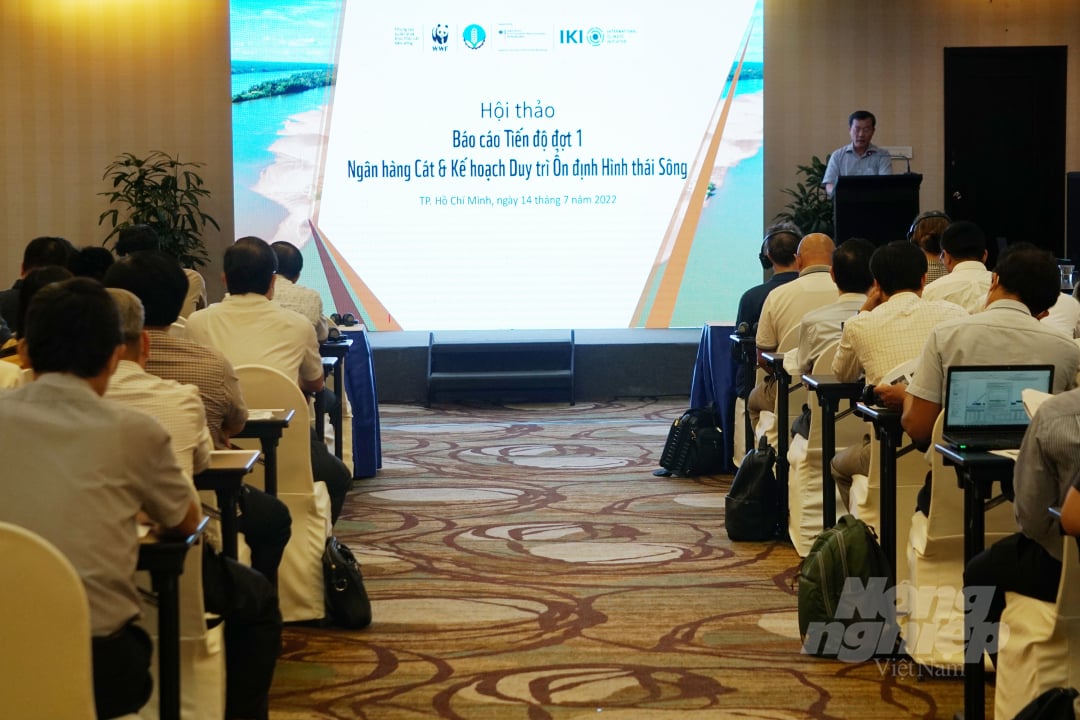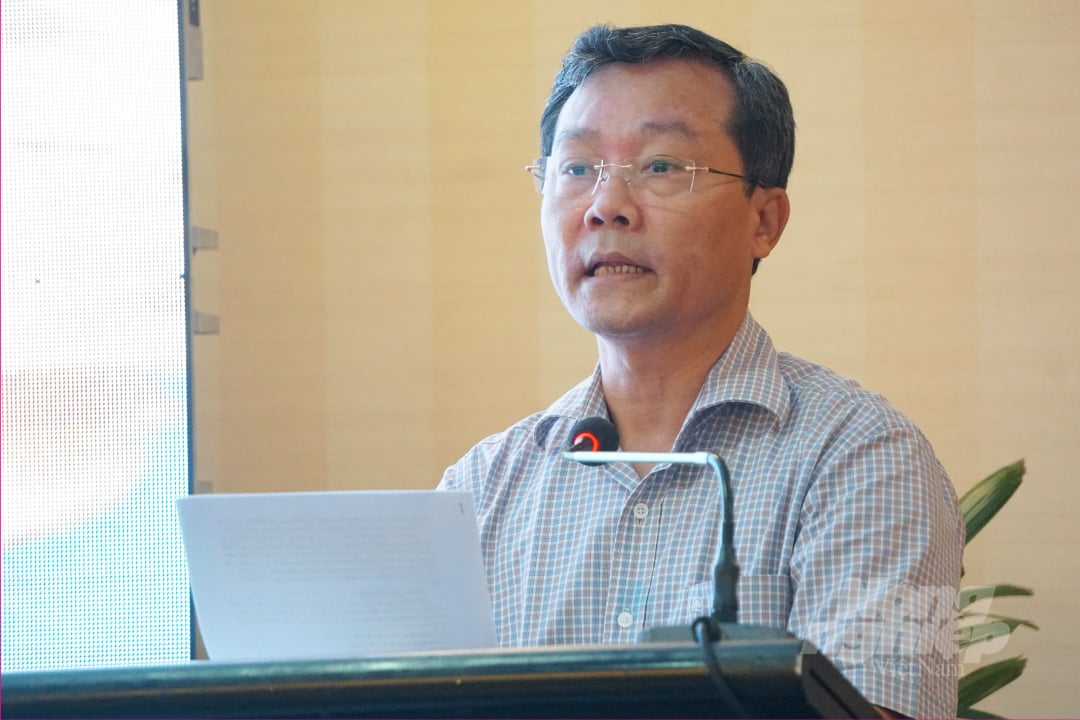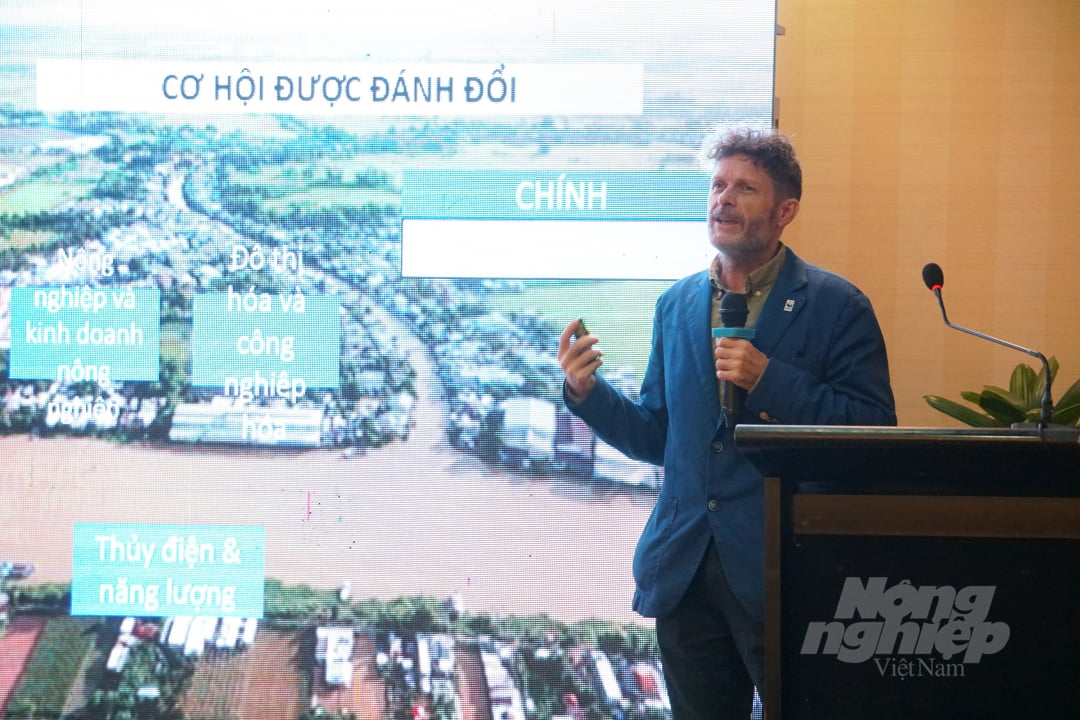November 27, 2025 | 23:44 GMT +7
November 27, 2025 | 23:44 GMT +7
Hotline: 0913.378.918
November 27, 2025 | 23:44 GMT +7
Hotline: 0913.378.918
Sand is key to maintaining the coastline and morphological stability of the Mekong Delta estuaries, flood patterns and preventing further inland intrusion.
Marc Goichot, World Wildlife Fund (WWF) Freshwater Lead Asia Pacific, made the statement at a workshop on "Building a sand bank and a plan to maintain river morphology in the Mekong Delta" on July 14 in Ho Chi Minh City.
The workshop was co-organised by the Vietnam Disaster Mangement Authority and the WWF- Vietnam.
Goichot said the impact of sand mining has not been fully addressed by climate research and policy so far.
Addressing sand mining as part of a comprehensive and systematic effort to build a more resilient delta is better than taking a cost-effective action to address the risks climate in the delta, he said.
He also added that for freshwater biodiversity, it is necessary to let rivers flow more naturally, improve water quality in freshwater ecosystems, protect and restore important habitats.
In particular, it needs ending overfishing and unsustainable sand mining in rivers and lakes as well as preventing and controlling invasions of non-native species, he said.
It should also protect naturally-flowing rivers and remove old dams, he said.

The workshop is organised in Ho Chi Minh City on July 14. Photo: Nguyen Thuy.
Speaking at the workshop, Nguyen Van Tien, Deputy General Director of the Viet Nam Disaster Mangement Authority said riverbank and coastal erosion in the Mekong Delta provinces has been developing very complex and it tends to increase.

Nguyen Van Tien, Deputy General Director of the Viet Nam Disaster Management Authority delivers his speech at the workshop. Photo: Nguyen Thuy.
Many areas of erosion have directly threatened people's lives and properties, natural disaster prevention works, riverside and coastal infrastructure, seriously affecting the ecological environment, he said.
A serious landslide recently occurred with a total length of 110m, inundating more than 300 local houses in the sea dyke of Khanh Binh Tay Commune, Tran Van Thoi District, Ca Mau Province, he said.
According to Tien, recent studies and reports from localities show that unsustainable sand and gravel exploitation is also one of the main causes of riverbank and coastal erosion, causing subsidence of infrastructure works in the delta, he said.
Hoang Viet, WWF – Vietnam’s Freshwater Programme Manager, said that the delta is a fertile land and a rice bowl of Vietnam.
It is facing many challenges due to climate change, upstream development, unsustainable sand mining, groundwater extraction, as well as the heavy use of chemicals in farming activities, making the delta become more at risk, especially in the face of climate change and extreme weather.

Marc Goichot, World Wildlife Fund (WWF) Freshwater Lead Asia Pacific at the workshop. Photo: Nguyen Thuy.
The Government has issued the Resolution No 120 on sustainable and adaptive development in the Mekong Delta, he said.
The resolution serves as the basis for our activities towards commitments from the Government, local authorities and units involved in the sustainable development of the delta, he said.
The workshop is within the framework of the project of “Climate change impact mitigation and disaster prevention via the public-private participation in sustainable sand exploitation in the Mekong Delta.”
The workshop was held in both offline and online form with the participation of many experts, scientists and relevant agencies of 13 provinces in the delta.
The workshop aims to officially announce the initial results of the project.
The project was jointly developed by WWF-Vietnam and the Vietnam Disaster Management Authority under the Ministry of Agriculture and Rural Development since 2019. It is scheduled to end in 2023 and funded by the German Government's International Climate Initiative through WWF-Germany.
The project will contribute to maintaining important ecological functions and mitigating socio-economic risks caused by climate change in the Mekong Delta. Specifically, it will build a database of total sediments (mainly sand and gravel) for the delta in collaboration with important partners. It will increase awareness of the community and decision-making agencies about the impacts of unsustainable sand and gravel mining, which increases natural disasters in the delta. It also enhances the ability of partners to access information on risks related to sand and gravel mining and promote the search for alternative sources of sand and gravel in the construction sector; developing recommendations and guidelines on sustainable sand and gravel exploitation and integrating them into policies on disaster prevention and sustainable development in the delta./.
Translated by Thu Hang

(VAN) On November 27, in the meeting with Minister Tran Duc Thang, Mayor Yin Yong shared Beijing’s experience to improve environment and air quality.

(VAN) After 30 years, both sides identified strategic areas of cooperation: sustainable production, increasing coffee value and training for farmers.
/2025/11/27/4910-4-164708_294.jpg)
(VAN) On the afternoon of November 27 in Beijing, Minister of Agriculture and Environment Tran Duc Thang held a working session with several major Chinese enterprises operating in the agriculture and environment sector.

(VAN) The Department of Animal Health issued a provisional guideline requesting local authorities to increase surveillance, collect samples for testing, and conduct epidemiological investigations according to the established procedure.

(VAN) The United Nations recommends that Vietnam utilize data and artificial intelligence to enhance early disaster warnings and reduce GDP losses by 3.2% in the context of climate change.

(VAN) On the morning of November 27 in Beijing, Minister Tran Duc Thang and the Deputy Commissioner General of the General Administration of Customs of China signed a protocol on fresh jackfruit exports.

(VAN) As floodwaters recede, a vast network of irrigation works across eastern Gia Lai is emerging in a state of severe disrepair, with extensive damage demanding urgent restoration ahead of the 2025-2026 winter-spring cropping season.